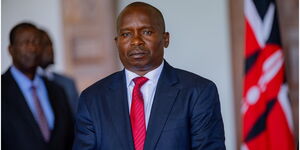The issue of national identity cards (IDs) is a hot potato for the government and Kenyans nationwide. For some, IDs take forever to arrive, but for those living along the country’s borders, obtaining an ID or a passport has been like playing Russian roulette.
However, President William Ruto has outlawed the secondary vetting process that has been causing grief for Kenyans living along the country’s borders with Somalia, Ethiopia, South Sudan, and Uganda.
Unlike most Kenyans in border counties, ethnic Somalis seeking IDs face an arduous vetting process before they can be issued with IDs or passports. Authorities cite national security concerns as the reason for the additional scrutiny, which is conducted by a multi-agency security committee comprising officials from the National Intelligence Service, local chiefs, police, and community elders.
Applicants must provide extensive documentation, including their grandparents' identification cards and testimony from witnesses who can verify their Kenyan birth—a burden not imposed on other citizens.
The Kenyan-Somali community has been forced to undergo this arduous process despite the law under the Registration of Persons Act, requiring Kenyans to apply for IDs to provide evidence of birth in Kenya in the form of birth notification, birth certificate, or baptismal card, for those born in Kenya; and evidence of citizenship either parents' Kenyan ID or passport.
With a stroke of a pen, however, President Ruto on February 5, 2025, abolished the extra vetting process for residents in all border areas of the country. The Presidential Proclamation, signed in Wajir town, abolished the Nairobi process, which has often delayed the issuance of crucial documents.
“We want the people of Northern Kenya to feel equal to the rest of the country,” the president said.
This does not mean there will be no vetting. The head of state has mandated that all vetting be conducted in accordance with the law and only at the local level.
Under the new guidelines, all Kenyans in border communities seeking to acquire the crucial document must be accompanied by a Kenyan adult. Ruto’s directive seeks to foster the ideal of Kenyans being their brother's keeper and to raise the alarm against any immigrants attempting to acquire citizenship through improper means.
“If it’s about vetting, let all children of Kenya be vetted equally without any discrimination,” President Ruto asserted.
This proclamation will benefit communities in Moyale, Mandera, Isiolo, Wajir, and Liboi, as well as those in Busia and Malaba.
Furthermore, with this move, the president aims to end corruption and the lengthy waiting process, which often results in many Kenyans missing opportunities.
The new directive places the country’s security organs at the forefront of detecting and preventing any illegal migrants from acquiring Kenyan citizenship.
The task of the Ministry of Interior through its intelligence arms of the National Intelligence Service (NIS), the Directorate of Criminal Investigations (DCI), and regular police have been tasked with ensuring the new mandate does not leave the country vulnerable to terror.












